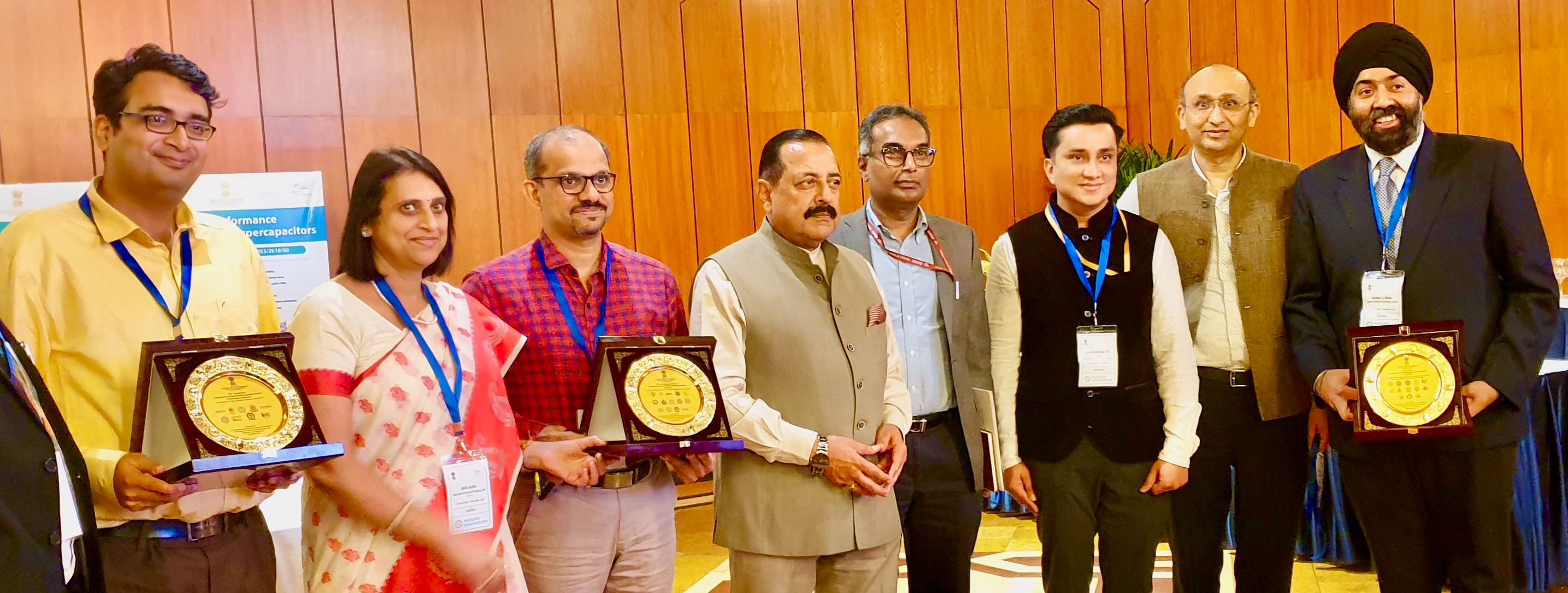Three Integrated Clean Energy Material Acceleration Platforms were launched at the MI Annual Gathering session on 4th April 2022, where new Energy Innovation Collaborations were announced.
Hon’ble Minister of Science and Technology Dr Jitendra Singh awarded the citations to the three centres leads of the Clean Energy Material Acceleration Platforms.
These Material Acceleration Platforms set up by the Department of Science and Technology (DST) would leverage emerging capabilities in next-generation computing, artificial intelligence (AI) and machine learning (ML), and robotics to accelerate the pace of materials discovery up to 10 times faster. The platforms constitute a knowledge network of more than 38 elite institutions and 80 research personnel working on next-generation low-cost advanced energy materials.

Dr Singh also announced the funding opportunity of Hydrogen Valley Platform, which is also a global initiative to optimise the hydrogen demand and supply by onsite generation and utilisation, utilise the renewable resources effectively, and water excess areas with geographical identity. The H2 Valleys objectives will be achieved through cohorts of clean hydrogen valleys to combine the complete hydrogen value chain (production, storage and transportation) with the aim of reaching critical scale and unlocking learning curve effects. DST has committed to facilitate the delivery of three clean hydrogen valleys in India by 2030.
The Mission Innovation (MI) Annual Gathering, which reviewed, discussed and set MI’s strategy and work plan, also shared insights on national priorities to build a network of senior clean energy innovation leaders.
Over the course of the three-day programme, senior clean energy innovation leaders advanced MI strategic priorities for 2022.
Mission Innovation brings together governments from every continent, international organisations, and private sector investors to spearhead the global investment and collaboration needed to achieve tipping points in making clean energy technology affordable and accessible worldwide.
Demonstrating how collaborating governments can accelerate innovation and contribute to the “Year of Implementation” is central to the MI agenda. Maximising long-term impact through partnerships and capacity building is another MI priority, as well as continuing to position MI as the key international clean energy innovation forum.
Following the launch of an ambitious second phase of the MI initiative in June 2021, MI 2.0, this gathering marked a crucial opportunity to agree on the actions needed in the decade of global clean energy innovation. Five out of a total of seven Missions have been launched over the past year. Focusing on power systems, hydrogen, shipping, urban transitions, and carbon dioxide removal, the missions resolved to accelerate technologies to facilitate clean energy transitions. When combined with those to come, the MI Missions have the potential to unlock affordable decarbonisation pathways for sectors responsible for 52% of current global emissions.
The three Integrated Clean Energy Material Acceleration Platforms set up by DST include:
DST-IISER Thiruvananthapuram Integrated Clean Energy Material Acceleration Platform on Storage: The consortium of 14 R&D institutes set up at IISER Thiruvananthapuram aims to accelerate the development of Solid-State Battery technology using Machine learning and Artificial Intelligence through automated processes. The centre would leverage the expertise and knowledge toward solid-state battery research.
DST-IIT Hyderabad Integrated Clean Energy Material Acceleration Platform on Bioenergy and Hydrogen: The centre nucleated at IIT Hyderabad aims to accelerate the development of ultra-efficient commercially biomass and waste-water to hydrogen conversion and storage systems through accelerated discovery of novel catalysts, novel storage systems and materials and optimised plant condition designs. The project will be implemented jointly between a team of scientists from 09 partnering institutes.
DST-IIT Kanpur Integrated Clean Energy Material Acceleration Platform on Materials: The objective of this platform is to design materials for energy harvesting by employing quantum and classical mechanics enabled atomistic simulations and AI & ML algorithms. The network of researchers engaged in the platform comprises of scientists from 13 elite institutions.
IC-MAP Brochures![]() 0 bytes
0 bytes






























